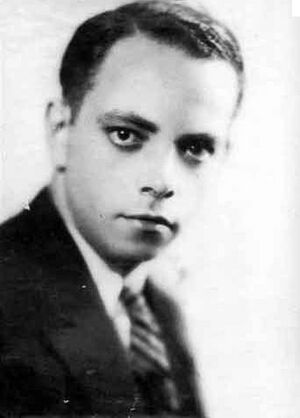Amadeo Roldán facts for kids
Amadeo Roldán y Gardes was a talented Cuban composer and violinist. He was born in Paris, France, on June 12, 1900. His mother was Cuban, and his father was Spanish. Amadeo's mother, Albertina Gardes, was a pianist. She taught all her children about music. His sister, María Teresa, became a mezzo-soprano singer, and his brother, Alberto, played the cello.
Contents
Early Music Journey
Amadeo Roldán studied music theory and violin at the Madrid Conservatory in Spain. He finished his studies in 1916. After that, he moved to Cuba in 1919.
A Leader in Cuban Music
In 1922, Amadeo became the concertmaster of the new Orquesta Sinfónica de la Habana. A concertmaster is the leader of the first-violin section in an orchestra. Later, he also became the concertmaster of the Orquesta Filarmónica of Havana. He even became the conductor of this orchestra in 1932. He also started the Havana String Quartet.
Pioneer of Afro-Cuban Music
Amadeo Roldán was a very important figure in the Afrocubanismo movement. This movement celebrated Afro-Cuban culture and traditions. Roldán was one of the first composers to use Afro-Cuban percussion instruments in his symphonic music. This made his music sound very unique and exciting.
His most famous work is a ballet called La Rebambaramba, which he composed in 1928.
Important Compositions
Roldán wrote many interesting pieces of music:
- Overture on Cuban Themes (1925)
- Three short poems: Oriente, Pregón, and Fiesta negra (1926)
- Two ballets: La Rebambaramba (1928) and El milagro de Anaquille (1929)
- A series of pieces called Rítmicas (1930)
- Poema negra (1930)
- Tres toques (which means "Three Touches") (1931)
Two of his Rítmicas pieces (the fifth and sixth) were special. They were among the first classical music pieces written only for a group of percussion instruments. This was a very new idea at the time.
In 1934, he wrote Motivos de son. These were eight pieces for voice and instruments. They were based on poems by the famous poet Nicolas Guillen. His very last compositions were two piano pieces for children, called Piezas infantiles (1937).
Amadeo Roldán's music was often played in concerts. These concerts were supported by the Pan-American Association of Composers. This group was started by Henry Cowell.
His Legacy
Amadeo Roldán passed away in Havana on March 7, 1939, at the age of 38. He died from a serious illness. He was at the peak of his creative powers. Roldán and another composer, Alejandro García Caturla, are seen as the founders of modern Cuban symphonic music. They both helped shape the sound of Cuban classical music forever.
See also
 In Spanish: Amadeo Roldán para niños
In Spanish: Amadeo Roldán para niños
- Amadeo Roldán Theater


